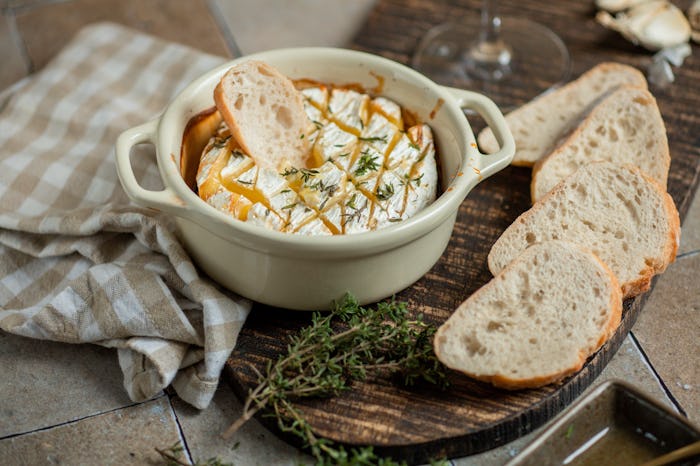Food Chatter

Can You Eat Baked Brie While Pregnant?
Put down the cheese knife and back away from the crostini.
Pregnancy is wonderful and magical and a gift — and it’s also sometimes kind of the worst. It feels like everything you even think about consuming comes with a question mark. Sick and need a Mucinex? Time to do some research. Can you eat sushi? Ugh, no. Your nightly cup of tea? Potentially unsafe. So of course when you see a very inviting cheese spread you have to stop ask yourself, can you eat baked brie while pregnant? Here’s what experts in maternal-fetal health have to say about it.
Can you eat baked brie while pregnant?
No, experts say it’s best to steer clear of brie — even the baked kind — until after you’ve had your baby (such a bummer). “With unpasteurized, white rind, soft cheese, the risk is listeria bacteria, which can cause severe infection in the uterus and in the amniotic sac, to the baby,” says Dr. Jill Rabin, M.D., OB-GYN at Northwell Health and professor of obstetrics and gynecology at the Donald and Barbara Zucker School of Medicine at Hofstra/Northwell.
“While the odds of being infected with listeriosis are very low, pregnant women are 10 times more likely to get listeriosis, due to their suppressed immune systems, which may result in tremendously dire consequences, such as stillbirth, miscarriage, or death, making consumption of these foods a risk many pregnant women are not willing to take,” says Natalie Carroll, M.S., RDN, women’s health dietitian and lactation counselor at Top Nutrition Coaching.
You can purchase pasteurized brie, but the pasteurization process may or may not kill all of the bacteria, Rabin points out. “It may be a little safer than unpasteurized, but there’s still a risk,” she says. While eating soft cheeses during pregnancy is generally understood to be a no-no, you’d think that baking the brie would kill any sketchy bacteria lurking within, right?
Carroll says it should, but if you’re going to make baked brie, you need to be cautious in doing so. “Cheese is a great source of protein and calcium, when assured it was made with pasteurized milk (check the label!) and heated to a steaming hot temperature,” she says. “Heating the brie to 165 degrees Fahrenheit or more to kill off listeria can also ensure that it is safe to eat in pregnancy.”
Still, if you want zero risk, it’s better to just say no to the baked brie, Rabin says. You would need to have a food thermometer to check that the internal temperature of the cheese reached 165 degrees, and that you may still not kill off the bacteria potentially within the rind. “You’ll have the baby soon enough and you can have your charcuterie back,” she says.
In short, these experts agree that while baked brie may be a top tier appetizer, taking a bite is not worth the risk of a serious infection.
Experts:
Dr. Jill Rabin, M.D., OB-GYN at Northwell Health and professor of obstetrics and gynecology at the Donald and Barbara Zucker School of Medicine at Hofstra/Northwell
Natalie Carroll, M.S., RDN, women’s health dietitian and lactation counselor at Top Nutrition Coaching